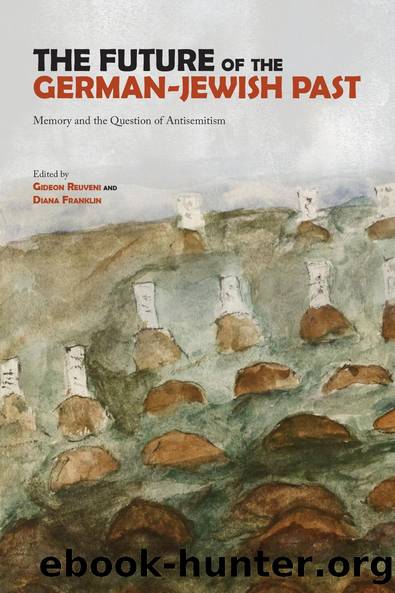The Future of the German-Jewish Past by Gideon Reuveni Diana Franklin

Author:Gideon Reuveni, Diana Franklin [Gideon Reuveni, Diana Franklin]
Language: eng
Format: epub
ISBN: 9781557537119
Barnesnoble:
Publisher: Purdue University Press
Published: 2020-12-15T00:00:00+00:00
ACKNOWLEDGMENTS
The research for this article was funded by the Austrian Science Fund (FWF), grant P31036-G28.
NOTES
1. See Moshe Rosman, How Jewish Is Jewish History? (Oxford: Littman Library of Jewish Civilization, 2007), 4.
2. Klaus Hödl, âJewish Studies without Jews: The Growth of an Academic Field in Austria and Germany,â in Maven in Blue Jeans. A Festschrift in Honor of Zev Garber, ed. Steven Leonard Jacobs (West Lafayette: Purdue University Press, 2009), 200â201.
3. Gerhard Bodendorfer, âEin Forschungsinstitut für âJüdische Kulturgeschichteâ in Salzburg?!,â in Jüdische Studien: Reflexionen zu Theorie und Praxis eines wissenschaftlichen Feldes, ed. Klaus Hödl (Innsbruck: Studienverlag, 2003), 51â72.
4. Cornelius Lehnguth, Waldheim und die Folgen. Der parteipolitische Umgang mit dem Nationalsozialismus in Ãsterreich (Frankfurt a.M.: Campus Verlag, 2013), 91â152.
5. Matti Bunzl, Jews and Queers: Symptoms of Modernity in Late Twentieth-Century Vienna (Berkeley: University of California Press, 1999), 30â32.
6. Richard Mitten, The Politics of Antisemitic Prejudice: The Waldheim Phenomenon in Austria (Boulder: Westview Press, 1992).
7. See âDas Jüdische Museum der Stadt Wien 1993/94. Chronik,â in Wiener Jahrbuch für jüdische Geschichte, Kultur und Museumswesen (Vienna: Verlag Christian Brandstätter, 1994/95), 187â193.
8. A copy of the review can be found among my private papers, and I am happy to make it available to anybody wishing to request it.
9. Paradigmatic examples of scholarly texts in which the authors intend to go beyond the Jewish and non-Jewish binary, but are nonetheless still caught up in dichotomous thinking, are Micha J. Perry and Rebekka VoÃ, âApproaching Shared Heroes: Cultural Transfer and Transnational Jewish History,â Jewish History 30 (2016): 1â13; Glenn Dynner, ed., Holy Dissent: Jewish and Christian Mystics in Eastern Europe (Detroit: Wayne State University Press, 2011), 1â2.
10. Stephen Jay Gould, âDeconstructing the âScience Warsâ by Reconstructing an Old Mold,â Science 287, no. 5451 (2002): 253.
11. Gould, âScience Wars,â 253. Regarding the issue of whether binary categorizations reflect peopleâs cultural embeddedness or originate from their âneural substrate,â see also Robert Sapolsky, âThis Is Your Brain on Nationalism: The Biology of Us and Them,â Foreign Affairs 98, no. 2 (2019): 42â47.
12. See Neil Asher Silberman, âRewriting Jewish History,â Archaeology 63, no. 4 (2010): 18, 58; Elisheva Baumgarten, Ruth Mazo Karras, and Katelyn Mesler, eds., Entangled Histories: Knowledge, Authority, and Jewish Culture in the Thirteenth Century (Philadelphia: University of Pennsylvania Press, 2017); Moshe Rosman, âA Jewish Guide to Medieval Domestic Europe. Review of E. Baumgarten, Mothers and Children: Jewish Family Life in Medieval Europe,â Jewish Quarterly Review 98 (2008): 419; Francesca Bregoli, âIntroduction. Connecting Histories: Jews and Their Others in Early Modern Europe,â in Connecting Histories. Jews and Their Others in Early Modern Europe, ed. Francesca Bregoli and David B. Ruderman (Philadelphia: University of Pennsylvania Press), 10. There were, in fact, various exceptions to this view. See David Berger, âA Generation of Scholarship on Jewish-Christian Interaction in the Medieval World,â Tradition 38, no. 2 (2004): 5.
13. Frank Golczewski, âA Jewish Space in an Extreme Context? German Ghettoes for Jews in Eastern Europe during World War II,â in Jewish and Non-Jewish Spaces in the Urban Context, ed. Alina Gromova, Felix Heinert, and Sebastian Voigt (Berlin: Neofelis Verlag, 2015), 102.
Download
This site does not store any files on its server. We only index and link to content provided by other sites. Please contact the content providers to delete copyright contents if any and email us, we'll remove relevant links or contents immediately.
| Archaeology | Essays |
| Historical Geography | Historical Maps |
| Historiography | Reference |
| Study & Teaching |
Underground: A Human History of the Worlds Beneath Our Feet by Will Hunt(11281)
Sapiens by Yuval Noah Harari(4567)
Navigation and Map Reading by K Andrew(4565)
Barron's AP Biology by Goldberg M.S. Deborah T(3640)
The Sympathizer by Viet Thanh Nguyen(3534)
5 Steps to a 5 AP U.S. History, 2010-2011 Edition (5 Steps to a 5 on the Advanced Placement Examinations Series) by Armstrong Stephen(3410)
Three Women by Lisa Taddeo(2928)
The Comedians: Drunks, Thieves, Scoundrels, and the History of American Comedy by Nesteroff Kliph(2795)
Water by Ian Miller(2602)
Drugs Unlimited by Mike Power(2198)
The House of Government by Slezkine Yuri(1854)
DarkMarket by Misha Glenny(1851)
The Library Book by Susan Orlean(1741)
A Short History of Drunkenness by Forsyth Mark(1735)
Revived (Cat Patrick) by Cat Patrick(1684)
The Woman Who Smashed Codes by Jason Fagone(1657)
And the Band Played On by Randy Shilts(1629)
The House of Rothschild: Money's Prophets, 1798-1848 by Niall Ferguson(1623)
Birth by Tina Cassidy(1575)
